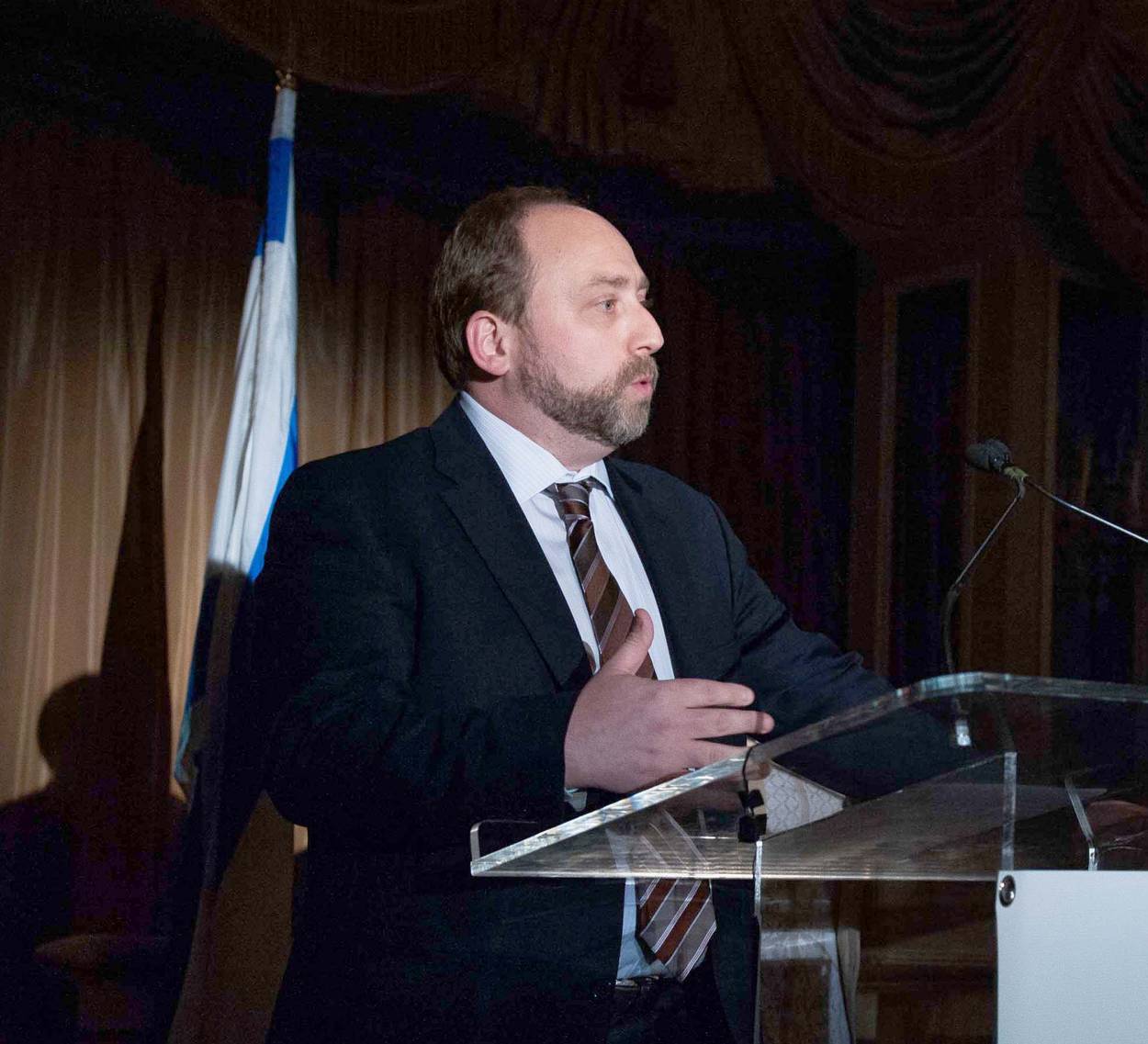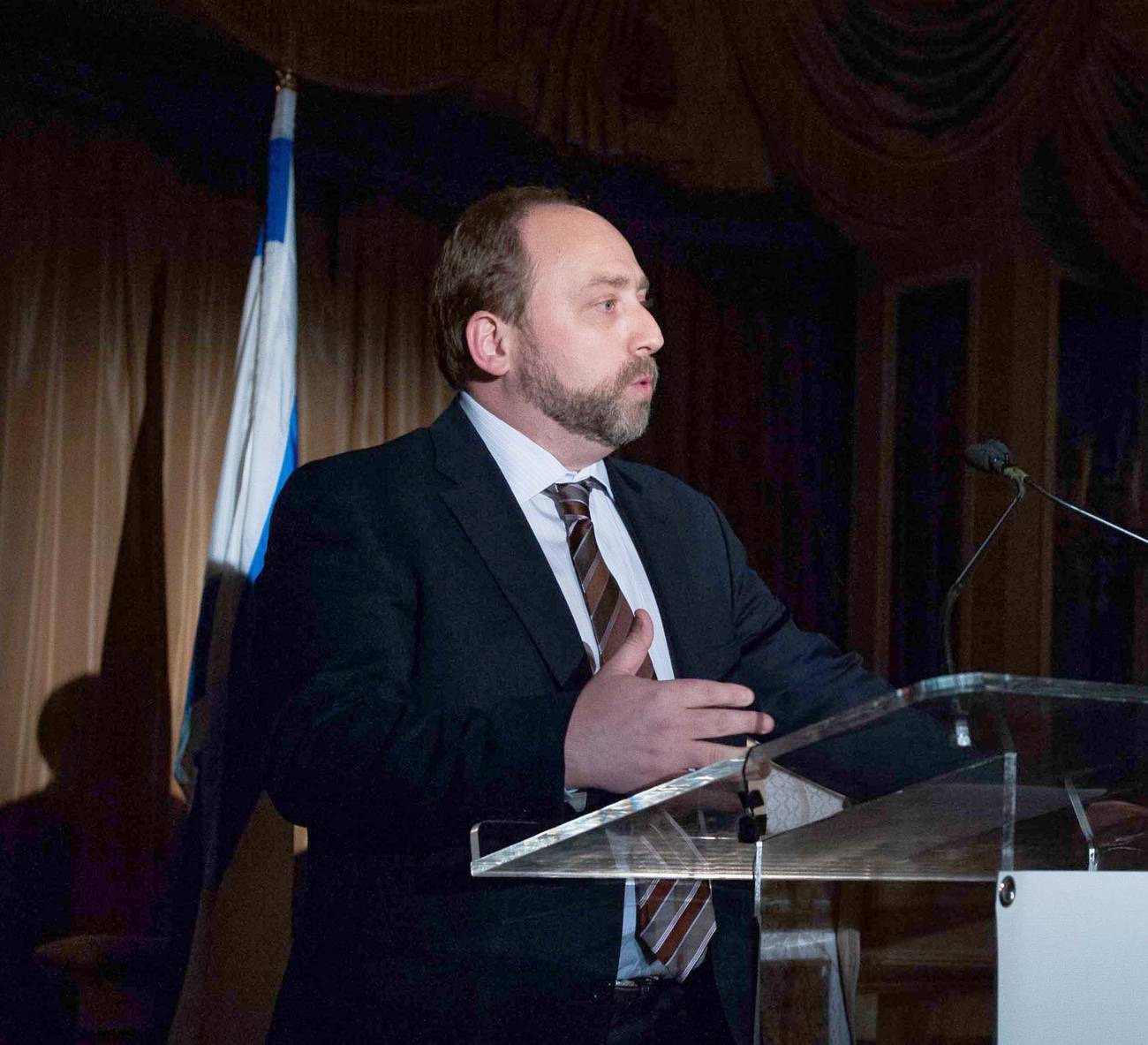A Portrait of the Philanthropist as a Young Man
Remembering Ilia Salita’s formative years in Moscow




Ilia Salita, president and CEO of Genesis Philanthropy Group, miracle-maker of Jewish philanthropy, died of cancer on June 29, at the age of 52. Over the past 10 years, through his visionary work of promoting Jewish Russian heritage and identity, Salita transformed the global landscape of Jewish philanthropy and community relations. His departure is a huge loss.
When I heard, from one of Salita’s closest friends and a fellow Russian immigrant, that Ilia is no more, I experienced a sense of existential shock. This was only the second time something like this happened since I left Russia. The first time was in 2014, when the talented pianist Maria (Masha) Barankina, my good friend since high school, died suddenly in Moscow. But Masha and I saw each other every time I would travel back to Russia; together—even though sometimes across the distance of the Atlantic—we had turned 30, then 40. With Ilia it was different: a hiatus of almost a quarter of a century. I emigrated in the early summer of 1987, he came to America several years later, and we did not have our reunion until 2011. We had been close as university classmates and saw each other many days a week as 17- and 18-year-olds in Moscow. Later, in America, now each of us a father of two American-born children, each of us with a familial claim to a small plot of American soil, we would occasionally see each other on work-related occasions. This is why I perceive his departure as a sign and a warning. Is our entire Brezhnevian generation born in the Soviet 1960s beginning to prepare for the final mission?
Ilia and I met at the end of August 1984 when we found ourselves the only two “open” Jews in our year at our college of Moscow State University. Of course, as was inevitable in the Soviet student environment, especially in the capital, our classmates included children of mixed marriages. But they either never spoke of their origins or did so in hush-hush fashion. Ilia and I—Jews by passport and upbringing—spoke loudly and proudly of our Jewishness. Above all else, the university experts in nationalities policy placed the two of us in the same group of about a dozen students, and for two years Ilia and I had all our classes together. Behind our back, some of our classmates called us “the Jewish faction.” Add to that the summer and fall months when Ilia and I lived in the same barracks while studying geology or picking potatoes and carrots, and you will understand why we knew each other well, trusted each other with the kinds of secrets that many people would be afraid of sharing back in those Soviet days.

There is a wonderful expression in the English language: “to have someone’s back.” This idiom does not translate well into Russian, and yet it comes to mind when I think of what united us. For two years Ilia and I had each other’s back, supported each other as fellow students and fellow Jews. After that came emigration, different personal and professional paths. But the living memory continued to bond us as it always took us back to the time when two young Russian Jews, Ilia and I, wandered across the city of Moscow while dreaming of New York, Rome, and Jerusalem.
I will share three episodes from our student years in Moscow. All three occurred in 1984 and 1985. I believe that in each of them the young Ilia Salita already acted the way he would conduct himself for the rest of his life—with daring, courage, and uprightness. And always with that fabled, bittersweet, Jewish humor.
The first episode has to do with the study of foreign languages. Both Ilia and I had graduated from language-intensive Moscow schools. Amid the sea of Soviet officialdom, we found refuge in the language of Lewis Carroll, Salinger, and the Beatles. (Besides English, which Ilia had mastered by the time he entered Moscow State, he also spoke some Italian, learned at home from his mother, a well-known Moscow teacher of Italian.) Together we placed out of the mandatory English-language classes and signed up for a special two-year advanced course for students of natural sciences. In reality it was an experimental laboratory of the living English language. Most of the weekly “double” class was allotted for the discussion of a novel. In the Soviet book market, the choice of officially circulating British and American novels was quite limited. The pirated editions were released—often with an ideological justification—by Moscow’s Progress Publishers. We read annotated Soviet editions, and vividly do I recall a class devoted to W. Somerset Maugham’s Theater. Our instructor (silk scarfs and pearls) did not come across as a prude. And yet she did her utmost to obfuscate the novel’s lesbian theme. Quite deliberately, we would pose innocently phrased and seemingly harmless questions. “Professor, why would one woman try to plant a passionate kiss on another woman’s mouth or act as though she is dying to see her naked?” Ilia would set the tone in these youthful attempts to expose the endless Soviet hypocrisy and puritanism. Our instructor would pretend that she had no idea what we were asking, since any reply would constitute a taboo violation. (Ilia and I decided not to bring up the fact that in Maugham’s novel Dolly de Fries, Julia Lambert’s admirer, is Jewish. We must have taken pity on our teacher as it would have been de trop—both lesbian love and Jewishness in the same class discussion.)
The second episode has Ilia delve into the world of Soviet weightlifting. As many young Jewish people who had experienced both the ululating mob and the hostility of some of our peers, Ilia and I were obsessed with images of physically mighty Jews. Of the two of us, I was considered the more athletic, a player of tennis and volleyball. Ilia was stockier, broader of shoulders. Boys that we still were, we often wrestled and competed with one another. Sometime in the late autumn of 1984, we decided to try out for the university weightlifting team. The coach was a short giant with a last name that suggested both Roman gladiators and French novels. The weightlifting team practiced somewhere in the extensive underground catacombs of the Moscow State University main tower. Sizing us up, the coach said: “Here’s the deal, lads. We’re all friends here. Why don’t you go ahead and take everything off down to your underwear, and then we’ll see.” In turn, they placed an Olympic bar with wheels before each of us. The coach immediately rejected me, whereas he not only accepted Ilia to the team but kept pounding him on the back and repeating molodets (“atta boy”) and “you can start tomorrow.”
In the third episode Ilia reveals himself as a Jew who not only knew his origins but was capable of expressing them not in Soviet newspeak but in the language of humanity. Of course Ilia knew that his noble last name is of Sephardic origin (Shalit-Shalita) and comes either from the abbreviation of the Hebrew expression that means “and blessed be his days, Amen” or the Hebrew word for “ruler.” Notable rabbis or community leaders are addressed this way. Around the 17th century the name traveled to Eastern Europe and the Baltics, and perhaps this link with the world of the Sephardim explains the privileged status of Italian in Ilia’s family. But how could one get into all this in public, at the university, where walls tended to have ears? Sometimes Ilia resorted to figurative or witty explanations. We had a classmate, N.P., not a stupid person, but a real demagogue and also given to mockery; his mellifluous last name hinted at his ancestor’s origins in the Russian nobility. I remember a conversation that took place in the village of Chashnikovo, outside Moscow, where university students did some of their summer field study and also the mandatory agricultural work in autumn. “Listen, Ilia,” our classmate asked without even hiding little barbs of superiority in his voice. “Does your last name rhyme with sirotá [“orphan”] or ulíta [“snail” or an antiquated Russian female name]?” After a year of studying together all the classmates knew that the stress in Ilia’s last name fell on the last syllable. Tension hung in the air. Ilia smiled with his eyes only and answered: “It almost rhymes with the Italian salita. When you’re in Italy, you’ll drive somewhere on the highway and remember me.” N.P. was flustered. I am pretty sure he did not know where the stress falls in the Italian word salita (the second syllable) yet did not want to give away his ignorance. Two years later, when my parents and I spent the summer of 1987 in Italy waiting for our U.S. refugee visas, I would often recall this episode and Ilia’s composed way. Especially while traveling across the country, where mountain roads almost invariably featured the sign salita rapida (“rapid ascent”).
This is how I remembered him best: intolerant of bigotry and hypocrisy, ready to take on the weight of the world, verbally inventive, always prepared to overcome unexpected heights and uphill battles. In his Soviet youth Ilia Salita developed the skills and ideas that would later make him the transformative leader of Jewish philanthropy that he became in America.
Maxim D. Shrayer is a bilingual author and a professor at Boston College. He was born in Moscow and emigrated in 1987. His recent books include A Russian Immigrant: Three Novellas and Immigrant Baggage, a memoir. Shrayer’s new collection of poetry, Kinship, will be published in April 2024.